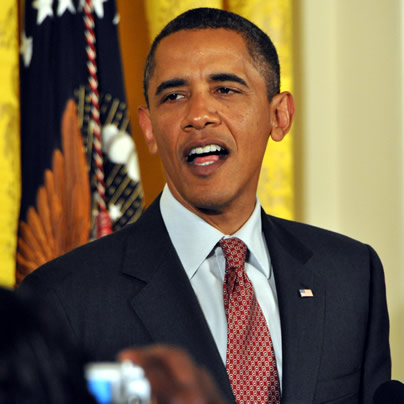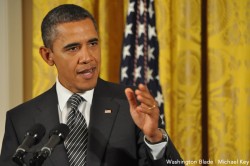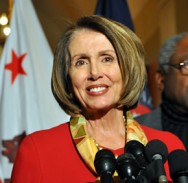National
Obama includes support for marriage equality in Pride proclamation
Employment protections absent from statement


President Obama mentions marriage in his 2012 Pride proclamation (Washington Blade photo by Michael Key)
President Obama for the first time included support for marriage rights for gay couples in his annual proclamation commemorating June as the month of Pride.
The president — who has issued a Pride proclamation for each of the four years in office — notes his personal support for marriage rights for gay couples in the 2012 proclamation issued on Friday following his recent announcement in favor of same-sex marriage during an ABC News interview. Last year’s proclamation made no mention whatsoever of relationship recognition for gay couples.
“And because we must treat others the way we want to be treated, I personally believe in marriage equality for same-sex couples,” Obama writes.
Evan Wolfson, president of Freedom to Marry, redoubled his previous praise for Obama when asked about the inclusion of marriage equality in the Pride proclamation.
“Support for the freedom to marry — like strong, authentic leadership — is good for the country and a political winner,” Wolfson said. “President Obama is showing both.”
Obama makes a special note to include LGBT people in the larger American story of “a proud and inexorable march toward freedom, fairness, and full equality under the law,” saying no one in the country should be deemed a second-class citizen or denied basic rights.
“The lesbian, gay, bisexual, and transgender (LGBT) community has written a proud chapter in this fundamentally American story,” Obama writes. “From brave men and women who came out and spoke out, to union and faith leaders who rallied for equality, to activists and advocates who challenged unjust laws and marched on Washington, LGBT Americans and allies have achieved what once seemed inconceivable. This month, we reflect on their enduring legacy, celebrate the movement that has made progress possible, and recommit to securing the fullest blessings of freedom for all Americans.”
The president also ticks off other accomplishments over his nearly three-and-a-half years in office, including legislative repeal of “Don’t Ask, Don’t Tell,” passage of hate crimes protections legislation, the enactment of a federal rule prohibiting LGBT discrimination in federal housing and a memorandum mandating hospitals offer visitation rights for same-sex couples.
The proclamation also states “more remains to be done to ensure every single American is treated equally, regardless of sexual orientation or gender identity” and says the Obama administration will continue to move forward in this area. However, the president makes no specific mention of further achievements that he wants to pursue.
Absent from the proclamation is any mention of the lack of federal employment non-discrimation protections for LGBT workers. In April, the White House announced that it wouldn’t issue at this time an executive order barring federal contractors from discriminating on the basis of sexual orientation and gender identity, opting instead to pursue legislation to institute these protections known as the Employment Non-Discrimination Act.
Tico Almeida, president of Freedom to Work, said he’s “not surprised that White House staffers” excluded any mention of employment non-discrimination for the proclamation because “workplace fairness for LGBT Americans is the one area of weakness and embarrassment in an otherwise impressive record of accomplishment by President Barack Obama.” Still, Almeida offered general praise.
“I think that overall the Proclamation is beautifully written and I am heartened that it mentions the need to make more progress on work that remains undone,” Almeida said.
Almeida said Pride month would be an “excellent time” for the White House to reconsider its decision and issue an executive order barring LGBT job bias. Additionally, Almeida called on Labor Secretary Hilda Solis to issue guidance this month saying the existing directive prohibiting sex discrimination will cover transgender workers to keep in line with a recent U.S. Equal Employment Opportunity Commission ruling.
Obama isn’t the only public official on the national stage to issue a statement commemorating June as the month of Pride. House Minority Leader Nancy Pelosi (D-Calif.) also issued a statement reflecting on the achievements of the LGBT community.
“During LGBT Pride Month, we celebrate how far we’ve come in the fight for civil rights, we pledge to keep working to ensure our nation lives up to the American ideal of equality, our heritage and our hope,” Pelosi said. “Since the dark days of the Stonewall riots more than four decades ago, millions of Americans have joined the struggle for equal protection under the law; the right to life, liberty, and the pursuit of happiness; respect and dignity for all Americans. Despite setbacks and obstacles along the way, we have made progress.”
Pelosi’s statement makes explicit mention of the lack of federal employment non-discrimination protections for LGBT people in addition to discrimination in other places. The House Democratic leader says,”We must keep up the charge for an end to discrimination in all its forms – in the workplace, in schools, in government, and in our laws.”
The text of Obama’s Pride proclamation follows:
THE WHITE HOUSE
Office of the Press Secretary
For Immediate Release
June 1, 2012
LESBIAN, GAY, BISEXUAL, AND TRANSGENDER PRIDE MONTH, 2012
– – – – – – –
BY THE PRESIDENT OF THE UNITED STATES OF AMERICA
A PROCLAMATION
From generation to generation, ordinary Americans have led a proud and inexorable march toward freedom, fairness, and full equality under the law — not just for some, but for all. Ours is a heritage forged by those who organized, agitated, and advocated for change; who wielded love stronger than hate and hope more powerful than insult or injury; who fought to build for themselves and their families a Nation where no one is a second-class citizen, no one is denied basic rights, and all of us are free to live and love as we see fit.
The lesbian, gay, bisexual, and transgender (LGBT) community has written a proud chapter in this fundamentally American story. From brave men and women who came out and spoke out, to union and faith leaders who rallied for equality, to activists and advocates who challenged unjust laws and marched on Washington, LGBT Americans and allies have achieved what once seemed inconceivable. This month, we reflect on their enduring legacy, celebrate the movement that has made progress possible, and recommit to securing the fullest blessings of freedom for all Americans.
Since I took office, my Administration has worked to broaden opportunity, advance equality, and level the playing field for LGBT people and communities. We have fought to secure justice for all under the Matthew Shepard and James Byrd, Jr., Hate Crimes Prevention Act, and we have taken action to end housing discrimination based on sexual orientation and gender identity. We expanded hospital visitation rights for LGBT patients and their loved ones, and under the Affordable Care Act, we ensured that insurance companies will no longer be able
to deny coverage to someone just because they are lesbian, gay, bisexual, or transgender. Because we understand that LGBT rights are human rights, we continue to engage with the international community in promoting and protecting the rights of LGBT persons around the world. Because we repealed “Don’t Ask, Don’t Tell,” gay, lesbian, and bisexual Americans can serve their country openly, honestly, and without fear of losing their jobs because of whom they love. And because we must treat others the way we want to be treated, I personally believe in marriage equality for same-sex couples.
More remains to be done to ensure every single American is treated equally, regardless of sexual orientation or gender identity. Moving forward, my Administration will continue its work to advance the rights of LGBT Americans. This month, as we reflect on how far we have come and how far we have yet to go, let us recall that the progress we have made is built on the words and deeds of ordinary Americans. Let us pay tribute to those who came before us, and those who continue their work today; and let us rededicate ourselves to a task that is
unending — the pursuit of a Nation where all are equal, and all have the full and unfettered opportunity to pursue happiness and live openly and freely.
NOW, THEREFORE, I, BARACK OBAMA, President of the United States of America, by virtue of the authority vested in me by the Constitution and the laws of the United States, do hereby proclaim June 2012 as Lesbian, Gay, Bisexual, and Transgender Pride Month. I call upon the people of the United States to eliminate prejudice everywhere it exists, and to celebrate the great diversity of the American people.
IN WITNESS WHEREOF, I have hereunto set my hand this first day of June, in the year of our Lord two thousand twelve, and of the Independence of the United States of America the two hundred and thirty-sixth.
BARACK OBAMA
# # #
Federal Government
Lambda Legal praises Biden-Harris administration’s finalized Title IX regulations
New rules to take effect Aug. 1

The Biden-Harris administration’s revised Title IX policy “protects LGBTQ+ students from discrimination and other abuse,” Lambda Legal said in a statement praising the U.S. Department of Education’s issuance of the final rule on Friday.
Slated to take effect on Aug. 1, the new regulations constitute an expansion of the 1972 Title IX civil rights law, which prohibits sex-based discrimination in education programs that receive federal funding.
Pursuant to the U.S. Supreme Court’s ruling in the landmark 2020 Bostock v. Clayton County case, the department’s revised policy clarifies that discrimination on the basis of sexual orientation and gender identity constitutes sex-based discrimination as defined under the law.
“These regulations make it crystal clear that everyone can access schools that are safe, welcoming and that respect their rights,” Education Secretary Miguel Cardona said during a call with reporters on Thursday.
While the new rule does not provide guidance on whether schools must allow transgender students to play on sports teams corresponding with their gender identity to comply with Title IX, the question is addressed in a separate rule proposed by the agency in April.
The administration’s new policy also reverses some Trump-era Title IX rules governing how schools must respond to reports of sexual harassment and sexual assault, which were widely seen as imbalanced in favor of the accused.
Jennifer Klein, the director of the White House Gender Policy Council, said during Thursday’s call that the department sought to strike a balance with respect to these issues, “reaffirming our longstanding commitment to fundamental fairness.”
“We applaud the Biden administration’s action to rescind the legally unsound, cruel, and dangerous sexual harassment and assault rule of the previous administration,” Lambda Legal Nonbinary and Transgender Rights Project Director Sasha Buchert said in the group’s statement on Friday.
“Today’s rule instead appropriately underscores that Title IX’s civil rights protections clearly cover LGBTQ+ students, as well as survivors and pregnant and parenting students across race and gender identity,” she said. “Schools must be places where students can learn and thrive free of harassment, discrimination, and other abuse.”
Michigan
Mich. Democrats spar over LGBTQ-inclusive hate crimes law
Lawmakers disagree on just what kind of statute to pass

Michigan could soon become the latest state to pass an LGBTQ-inclusive hate crime law, but the state’s Democratic lawmakers disagree on just what kind of law they should pass.
Currently, Michigan’s Ethnic Intimidation Act only offers limited protections to victims of crime motivated by their “race, color, religion, gender, or national origin.” Bills proposed by Democratic lawmakers expand the list to include “actual or perceived race, color, religion, gender, sexual orientation, gender identity or expression, ethnicity, physical or mental disability, age, national origin, or association or affiliation with any such individuals.”
Democratic Gov. Gretchen Whitmer and Attorney General Dana Nessel have both advocated for a hate crime law, but house and senate Democrats have each passed different hate crimes packages, and Nessel has blasted both as being too weak.
Under the house proposal that passed last year (House Bill 4474), a first offense would be punishable with a $2,000 fine, up to two years in prison, or both. Penalties double for a second offense, and if a gun or other dangerous weapons is involved, the maximum penalty is six years in prison and a fine of $7,500.
But that proposal stalled when it reached the senate, after far-right news outlets and Fox News reported misinformation that the bill only protected LGBTQ people and would make misgendering a trans person a crime. State Rep. Noah Arbit, the bill’s sponsor, was also made the subject of a recall effort, which ultimately failed.
Arbit submitted a new version of the bill (House Bill 5288) that added sections clarifying that misgendering a person, “intentionally or unintentionally” is not a hate crime, although the latest version (House Bill 5400) of the bill omits this language.
That bill has since stalled in a house committee, in part because the Democrats lost their house majority last November, when two Democratic representatives resigned after being elected mayors. The Democrats regained their house majority last night by winning two special elections.
Meanwhile, the senate passed a different package of hate crime bills sponsored by state Sen. Sylvia Santana (Senate Bill 600) in March that includes much lighter sentences, as well as a clause ensuring that misgendering a person is not a hate crime.
Under the senate bill, if the first offense is only a threat, it would be a misdemeanor punishable by one year in prison and up to $1,000 fine. A subsequent offense or first violent hate crime, including stalking, would be a felony that attracts double the punishment.
Multiple calls and emails from the Washington Blade to both Arbit and Santana requesting comment on the bills for this story went unanswered.
The attorney general’s office sent a statement to the Blade supporting stronger hate crime legislation.
“As a career prosecutor, [Nessel] has seen firsthand how the state’s weak Ethnic Intimidation Act (not updated since the late 1980’s) does not allow for meaningful law enforcement and court intervention before threats become violent and deadly, nor does it consider significant bases for bias. It is our hope that the legislature will pass robust, much-needed updates to this statute,” the statement says.
But Nessel, who has herself been the victim of racially motivated threats, has also blasted all of the bills presented by Democrats as not going far enough.
“Two years is nothing … Why not just give them a parking ticket?” Nessel told Bridge Michigan.
Nessel blames a bizarre alliance far-right and far-left forces that have doomed tougher laws.
“You have this confluence of forces on the far right … this insistence that the First Amendment protects this language, or that the Second Amendment protects the ability to possess firearms under almost any and all circumstances,” Nessel said. “But then you also have the far left that argues basically no one should go to jail or prison for any offense ever.”
The legislature did manage to pass an “institutional desecration” law last year that penalizes hate-motivated vandalism to churches, schools, museums, and community centers, and is LGBTQ-inclusive.
According to data from the U.S. Department of Justice, reported hate crime incidents have been skyrocketing, with attacks motivated by sexual orientation surging by 70 percent from 2020 to 2022, the last year for which data is available.
Twenty-two states, D.C., Puerto Rico, and the U.S. Virgin Islands have passed LGBTQ-inclusive hate crime laws. Another 11 states have hate crime laws that include protections for “sexual orientation” but not “gender identity.”
Michigan Democrats have advanced several key LGBTQ rights priorities since they took unified control of the legislature in 2023. A long-stalled comprehensive anti-discrimination law was passed last year, as did a conversion therapy ban. Last month the legislature updated family law to make surrogacy easier for all couples, including same-sex couples.
A bill to ban the “gay panic” defense has passed the state house and was due for a Senate committee hearing on Wednesday.
Indiana
Drag queen announces run for mayor of Ind. city
Branden Blaettne seeking Fort Wayne’s top office

In a Facebook post Tuesday, a local drag personality announced he was running for the office of mayor once held by the late Fort Wayne Mayor Tom Henry, who died last month just a few months into his fifth term.
Henry was recently diagnosed with late-stage stomach cancer and experienced an emergency that landed him in hospice care. He died shortly after.
WPTA, a local television station, reported that Fort Wayne resident Branden Blaettne, whose drag name is Della Licious, confirmed he filed paperwork to be one of the candidates seeking to finish out the fifth term of the late mayor.
Blaettner, who is a community organizer, told WPTA he doesn’t want to “get Fort Wayne back on track,” but rather keep the momentum started by Henry going while giving a platform to the disenfranchised groups in the community. Blaettner said he doesn’t think his local fame as a drag queen will hold him back.
“It’s easy to have a platform when you wear platform heels,” Blaettner told WPTA. “The status quo has left a lot of people out in the cold — both figuratively and literally,” Blaettner added.

The Indiana Capital Chronicle reported that state Rep. Phil GiaQuinta, who has led the Indiana House Democratic caucus since 2018, has added his name to a growing list of Fort Wayne politicos who want to be the city’s next mayor. A caucus of precinct committee persons will choose the new mayor.
According to the Fort Wayne Journal Gazette, the deadline for residents to file candidacy was 10:30 a.m. on Wednesday. A town hall with the candidates is scheduled for 6 p.m. on Thursday at Franklin School Park. The caucus is set for 10:30 a.m. on April 20 at the Lincoln Financial Event Center at Parkview Field.
At least six candidates so far have announced they will run in the caucus. They include Branden Blaettne, GiaQuinta, City Councilwoman Michelle Chambers, City Councilwoman Sharon Tucker, former city- and county-council candidate Palermo Galindo, and 2023 Democratic primary mayoral candidate Jorge Fernandez.
-

 Africa4 days ago
Africa4 days agoCongolese lawmaker introduces anti-homosexuality bill
-

 District of Columbia1 day ago
District of Columbia1 day agoReenactment of first gay rights picket at White House draws interest of tourists
-

 World4 days ago
World4 days agoOut in the World: LGBTQ news from Europe and Asia
-

 Arizona1 day ago
Arizona1 day agoAriz. governor vetoes anti-transgender, Ten Commandments bill













